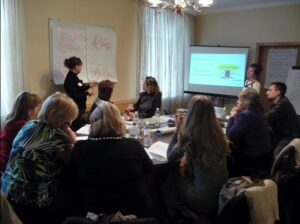Improving Reproductive Health Services by Addressing Gender Issues in Ukraine

By Megan Ivankovich on January 5, 2015
In October, I had the opportunity to travel to Ukraine to support the USAID ASSIST Project to integrate gender into the work currently underway. ASSIST is working with the Ministry of Health in Ukraine to improve reproductive health services at the primary health care level by working specifically to decrease alcohol and tobacco use by pregnant women, to improve health outcomes for mothers and babies.
Males and females face different levels of susceptibility to health concerns based on their genetic makeup as well as on prevailing gender norms that influence behaviors and quality of health services. For example, 46% of women in Ukraine reported alcohol use in the most recent months of pregnancy, yet counseling on the reduction of alcohol use during pregnancy is insufficient since health providers often don’t consider women at risk because these behaviors have been historically associated with men and boys. In addition, exposure to environmental pollutants such as second-hand smoke can negatively impact the health of pregnant women and their babies.
In Poltava, Ukraine, 49% of women live or spend time with someone with smoke around them and globally, roughly 47% of deaths caused by second-hand smoke are in women, while just 26% are in men. Power imbalances can cause women to be less able to negotiate smoke-free spaces in work places, social gatherings, and in their own home. Gender-related power inequalities also have implications for treatment, as women may depend on their husbands or partners for health care decision-making, access, and expenditures. Lack of awareness among women and health care providers of the risk faced by women may negatively affect health-seeking behaviors, prevention, and early detection and treatment of this serious disease.
In September, the USAID ASSIST Project in Ukraine conducted research to better understand how gender impacts the project’s target health issues (i.e., alcohol, tobacco use, and violence during pregnancy). A quantitative survey was developed by Dr. Elena Novichkova, with input from our WI-HER LLC team. Data was collected from more than 600 women and adolescents of reproductive age that attended participating women’s health centers in Poltava Oblast. The survey found that while only 10 percent of pregnant women reported smoking while pregnant, almost half were regularly subjected to secondhand smoke. In addition, around fifteen percent of pregnant women reported drinking during their pregnancy, and drinking was associated with having family members who had a history of alcohol use. Further research on the topic of violence and a deeper analysis of survey data should be conducted.
As a follow up to the survey, I traveled to Ukraine in October to conduct two gender integration trainings for the USAID ASSIST Project in Ukraine for doctors in Poltava and advisors in Kiev. Sessions included defining gender and gender-related concepts, identifying gender issues and gaps through a gender analysis, addressing gender issues and gaps by designing changes to test, and analyzing and reporting results using sex-disaggregated data and gender-sensitive indicators. Results from the quantitative gender survey were shared with participants at the two gender integration trainings and the survey results were utilized during training exercises.
The participants seemed to thoroughly enjoy the trainings. They were quick to understand new concepts and successfully applied new knowledge to their own work in training exercises. They were incredibly participatory and eager to share their opinions and experiences (professional and personal) related to gender. Participants also seemed to understand the importance of gender integration and recognized the need to incorporate gender into their programming.
Gender issues related to alcohol and tobacco use in pregnant women need to be taken into account when designing, implementing, and evaluating strategies and services. Based on these trainings and technical assistance on gender integration provided to the project in October 2014, I proposed several potential short- and long-term recommendations to integrate gender into the project using the science of improvement. I look forward to supporting the ASSIST team in Ukraine to actualize these recommendations and to seeing the great successes of their hard work come to fruition in the coming months. For more information on how to integrate gender into development programs, check out our gender integration resources.